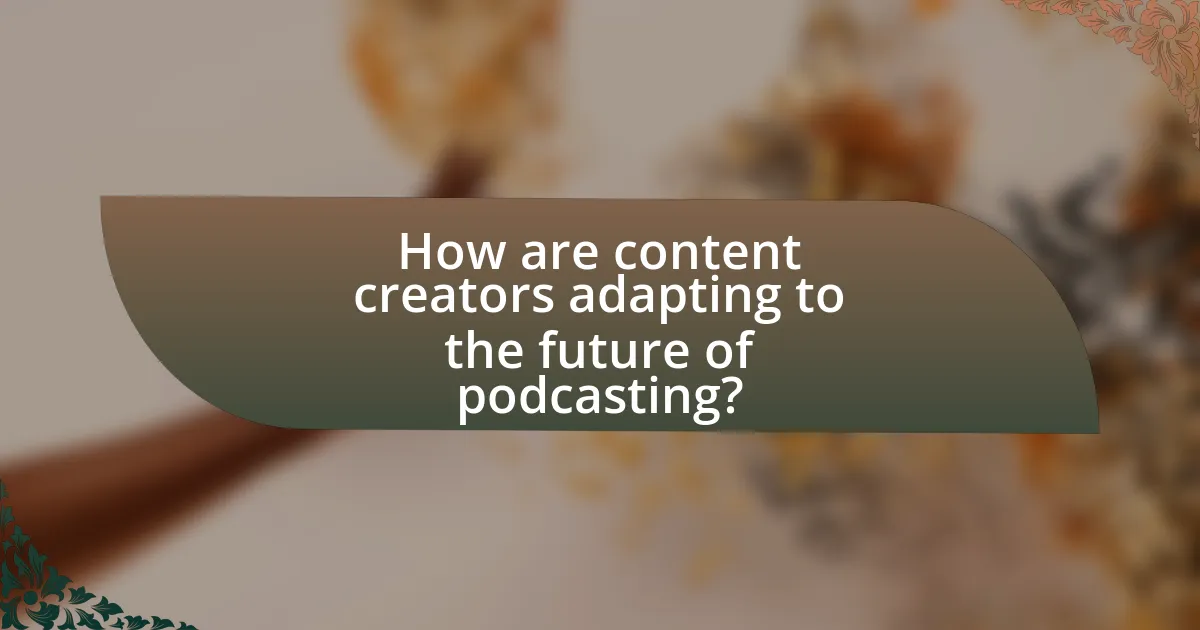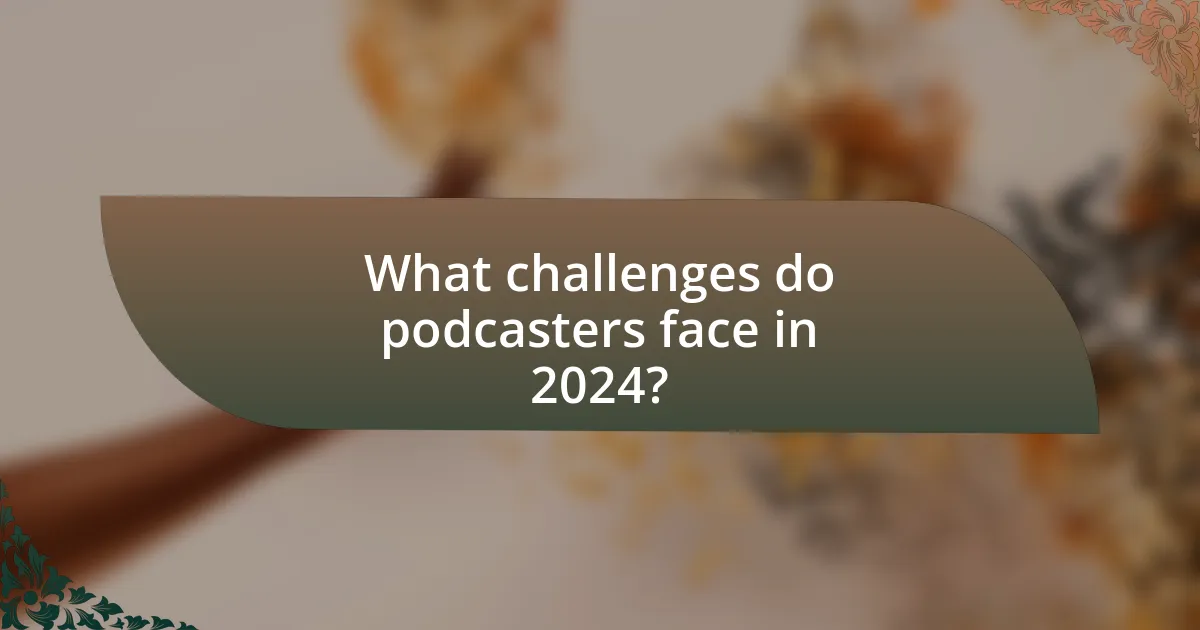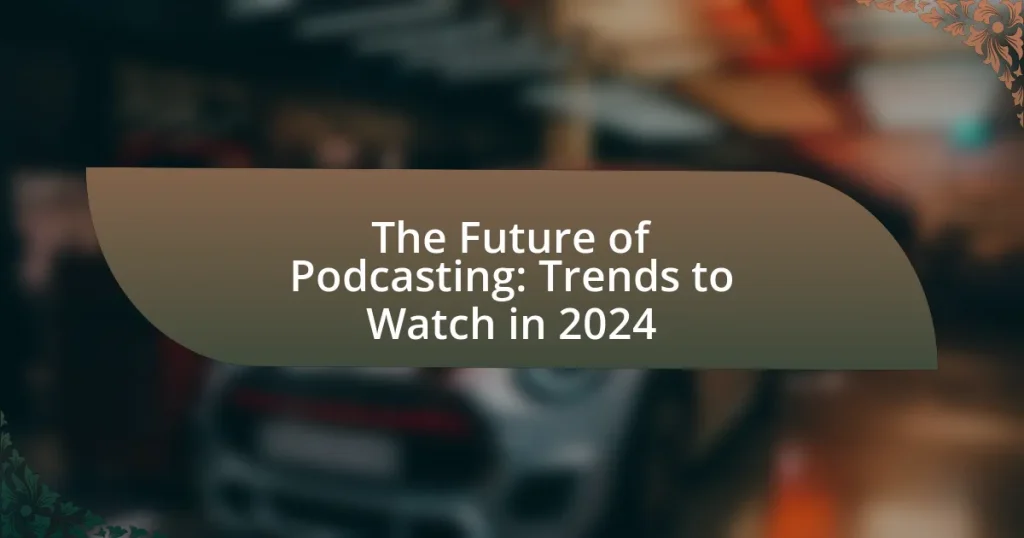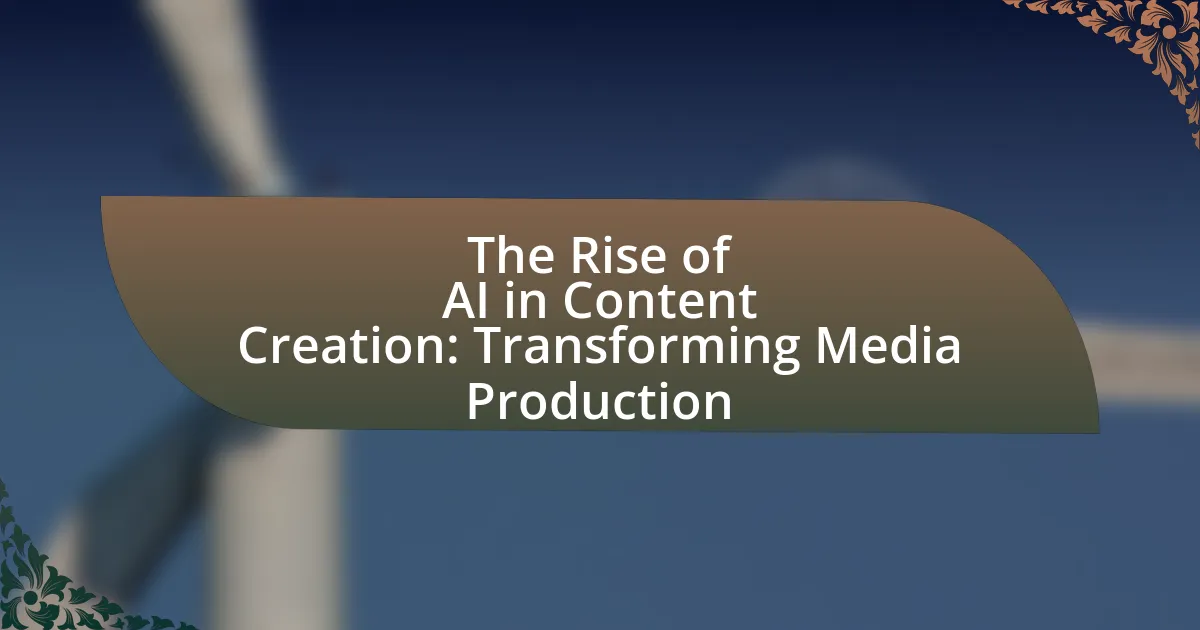The article focuses on the future of podcasting, highlighting key trends expected to shape the industry in 2024. It discusses the rise of interactive content, AI-driven personalization, and the expansion of niche markets, emphasizing how these elements enhance audience engagement. Additionally, it examines the impact of technological advancements, evolving monetization models, and the importance of data analytics in content creation. The article also addresses challenges faced by podcasters, including competition and regulatory considerations, while outlining best practices for success in a rapidly changing landscape.

What are the key trends shaping the future of podcasting in 2024?
Key trends shaping the future of podcasting in 2024 include the rise of interactive content, increased personalization through AI, and the growth of niche markets. Interactive content allows listeners to engage with podcasts in real-time, enhancing user experience and retention. AI-driven personalization tailors recommendations and content to individual preferences, which is supported by a 2023 report from Edison Research indicating that 60% of podcast listeners prefer personalized content. Additionally, niche markets are expanding as creators target specific audiences, with data from Statista showing that 45% of new podcasts in 2023 focused on specialized topics, reflecting a shift towards more curated content.
How is audience engagement evolving in the podcasting landscape?
Audience engagement in the podcasting landscape is evolving through increased interactivity and personalization. Platforms are now integrating features such as listener polls, Q&A sessions, and social media interactions, allowing audiences to participate actively in content creation. According to a 2023 report by Edison Research, 60% of podcast listeners prefer shows that incorporate audience feedback, highlighting the demand for more interactive experiences. Additionally, advancements in data analytics enable podcasters to tailor content to listener preferences, enhancing engagement by delivering personalized recommendations and targeted advertising. This shift towards a more participatory model is reshaping how audiences connect with podcasts, making engagement more dynamic and responsive.
What new formats are emerging to enhance listener interaction?
New formats emerging to enhance listener interaction include interactive podcasts, live audio experiences, and audience-driven content. Interactive podcasts allow listeners to engage through polls, questions, and real-time feedback, fostering a two-way communication channel. Live audio experiences, such as those on platforms like Clubhouse or Twitter Spaces, enable real-time discussions and audience participation, creating a sense of community. Audience-driven content, where listeners suggest topics or contribute segments, further personalizes the experience and increases engagement. These formats are gaining traction as they cater to the growing demand for participatory media, reflecting a shift towards more immersive and collaborative listening experiences.
How do listener preferences influence content creation?
Listener preferences significantly influence content creation by guiding the topics, formats, and styles that creators choose to pursue. For instance, data from Edison Research indicates that 54% of podcast listeners prefer narrative storytelling, prompting creators to develop more engaging, story-driven content. Additionally, audience feedback and analytics help creators understand which episodes resonate most, leading to adjustments in future content to better align with listener interests. This responsiveness to listener preferences not only enhances audience engagement but also drives the overall success of podcasting as a medium.
What technological advancements are impacting podcasting?
Technological advancements significantly impacting podcasting include improved audio editing software, enhanced distribution platforms, and AI-driven content creation tools. Advanced audio editing software, such as Descript and Adobe Audition, allows creators to produce high-quality sound with ease, streamlining the editing process. Enhanced distribution platforms like Spotify and Apple Podcasts have integrated features that facilitate easier access and monetization for podcasters, increasing audience reach. Additionally, AI-driven tools, such as automated transcription services and content recommendation algorithms, are transforming how creators generate and promote their content, making it more accessible and tailored to listener preferences. These advancements collectively contribute to the growth and evolution of the podcasting landscape.
How is artificial intelligence being utilized in podcast production?
Artificial intelligence is utilized in podcast production primarily through automated editing, content generation, and audience engagement analysis. AI-driven tools can streamline the editing process by automatically removing filler words, silences, and background noise, significantly reducing production time. For instance, platforms like Descript leverage AI to provide transcription and editing capabilities that allow creators to edit audio by editing text. Additionally, AI algorithms can generate show notes, summaries, and even suggest topics based on trending themes, enhancing content relevance. Furthermore, AI analyzes listener data to provide insights into audience preferences, enabling podcasters to tailor their content effectively. This integration of AI in podcast production not only improves efficiency but also enhances the overall quality and engagement of the podcasts.
What role does data analytics play in shaping podcast strategies?
Data analytics plays a crucial role in shaping podcast strategies by providing insights into listener behavior and preferences. By analyzing metrics such as download numbers, listener demographics, and engagement rates, podcast creators can tailor content to better meet audience demands. For instance, a study by Edison Research found that 54% of podcast listeners prefer shows that align with their interests, highlighting the importance of data-driven content curation. Additionally, analytics can inform marketing strategies, allowing for targeted promotions that reach specific audience segments, ultimately enhancing listener retention and growth.
What are the anticipated changes in podcast monetization models?
Anticipated changes in podcast monetization models include a shift towards subscription-based models and increased integration of dynamic ad insertion technology. As more listeners seek exclusive content, platforms like Spotify and Apple Podcasts are enhancing their subscription offerings, allowing creators to monetize directly through listener support. Additionally, dynamic ad insertion enables advertisers to target specific audiences more effectively, leading to higher revenue potential for podcasters. According to a report by PwC, podcast advertising revenue is expected to reach $2 billion by 2023, indicating a growing market that favors innovative monetization strategies.
How are sponsorships and advertising evolving in the podcasting space?
Sponsorships and advertising in the podcasting space are evolving towards more targeted and data-driven approaches. Advertisers are increasingly utilizing listener analytics to tailor their messages, ensuring that ads resonate with specific audience segments. For instance, according to a 2023 report by Edison Research, 60% of podcast listeners prefer ads that are relevant to their interests, prompting brands to invest in dynamic ad insertion technology that allows for real-time ad customization. This shift not only enhances listener engagement but also improves conversion rates for advertisers, as evidenced by a 2022 study from the Interactive Advertising Bureau, which found that podcast ads have a 4.4% average conversion rate, significantly higher than traditional media.
What alternative revenue streams are podcasters exploring?
Podcasters are exploring alternative revenue streams such as subscription models, crowdfunding, merchandise sales, and live events. Subscription models allow listeners to pay for exclusive content, with platforms like Patreon enabling creators to monetize their audience directly. Crowdfunding through platforms like Kickstarter helps podcasters finance specific projects or seasons, while merchandise sales provide an additional income source by selling branded products. Live events, including podcast tours and meet-and-greets, create opportunities for direct audience engagement and ticket sales, further diversifying revenue. These strategies reflect a growing trend among podcasters to seek financial independence beyond traditional advertising.

How are content creators adapting to the future of podcasting?
Content creators are adapting to the future of podcasting by diversifying their content formats and leveraging technology to enhance listener engagement. Many creators are incorporating video elements into their podcasts, as platforms like YouTube and TikTok gain popularity, allowing them to reach broader audiences. Additionally, they are utilizing advanced analytics tools to understand listener preferences and tailor content accordingly, which is supported by a 2023 report from Edison Research indicating that 80% of podcast listeners prefer personalized content. Furthermore, creators are exploring monetization strategies such as subscription models and exclusive content offerings, responding to the growing demand for premium audio experiences.
What strategies are podcasters using to stand out in a crowded market?
Podcasters are using niche targeting, high-quality production, and unique storytelling to stand out in a crowded market. By focusing on specific topics that cater to particular audiences, podcasters can build a loyal listener base. High-quality production, including professional audio and editing, enhances the listening experience, making content more appealing. Unique storytelling techniques, such as incorporating personal narratives or innovative formats, differentiate their shows from others. According to a 2023 report by Edison Research, niche podcasts have seen a 20% increase in listenership, demonstrating the effectiveness of these strategies in attracting dedicated audiences.
How important is niche targeting for podcast success?
Niche targeting is crucial for podcast success, as it allows creators to connect deeply with a specific audience. By focusing on a defined niche, podcasters can tailor content that resonates with listeners’ interests, leading to higher engagement and loyalty. According to a study by Edison Research, 80% of podcast listeners prefer shows that cater to their specific interests, demonstrating that niche content can significantly enhance listener retention and growth. This targeted approach not only helps in building a dedicated listener base but also attracts advertisers looking for specific demographics, further contributing to the podcast’s financial success.
What role does storytelling play in attracting and retaining listeners?
Storytelling plays a crucial role in attracting and retaining listeners by creating emotional connections and enhancing engagement. Engaging narratives captivate audiences, making content more relatable and memorable. Research indicates that storytelling can increase listener retention rates by up to 65%, as it fosters a sense of involvement and investment in the content. This emotional resonance encourages listeners to return for more episodes, thereby building a loyal audience base.
How are collaborations and partnerships influencing podcast growth?
Collaborations and partnerships are significantly influencing podcast growth by expanding audience reach and enhancing content diversity. When podcasters collaborate, they tap into each other’s listener bases, which can lead to increased downloads and subscriptions. For instance, a study by Edison Research found that 54% of podcast listeners discover new shows through recommendations from other podcasts, highlighting the effectiveness of cross-promotion. Additionally, partnerships with brands or other media entities can provide financial support and resources, allowing podcasters to invest in higher-quality production and marketing efforts. This synergy not only attracts new listeners but also fosters a more engaged community around the content, driving overall growth in the podcasting industry.
What benefits do podcasters gain from cross-promotions?
Podcasters gain increased audience reach and engagement from cross-promotions. By collaborating with other podcasters, they can tap into new listener bases, which can lead to higher download numbers and greater visibility. For instance, a study by Edison Research indicates that 54% of podcast listeners discover new shows through recommendations, highlighting the effectiveness of cross-promotional strategies. Additionally, cross-promotions can enhance content diversity, as podcasters share different perspectives and topics, enriching the listening experience and fostering community among audiences.
How can partnerships enhance content diversity and reach?
Partnerships can enhance content diversity and reach by combining the unique strengths and audiences of different creators or organizations. When two or more entities collaborate, they can share resources, expertise, and distribution channels, which allows for a broader range of topics and perspectives to be presented. For instance, a partnership between a niche podcast and a mainstream media outlet can introduce specialized content to a wider audience, thereby increasing listener engagement and expanding the reach of both parties. Research indicates that collaborative efforts in media often lead to increased audience growth; for example, a study by the Pew Research Center found that partnerships in digital media can result in a 30% increase in audience size due to cross-promotion and shared networks.

What challenges do podcasters face in 2024?
Podcasters in 2024 face several significant challenges, including increased competition, monetization difficulties, and evolving audience preferences. The podcasting landscape has become saturated, with over 2 million active podcasts, making it harder for new creators to gain visibility and attract listeners. Additionally, monetization remains a complex issue, as many podcasters struggle to secure sponsorships or generate revenue through subscriptions, especially with the rise of ad-blocking technologies. Furthermore, audience preferences are shifting towards shorter, more engaging content, requiring podcasters to adapt their formats and production quality to retain listener interest. These challenges necessitate strategic planning and innovation for podcasters aiming to succeed in a competitive environment.
How is competition affecting independent podcasters?
Competition is significantly impacting independent podcasters by increasing the pressure to produce high-quality content and innovate to capture audience attention. As major platforms and established creators dominate the podcasting landscape, independent podcasters face challenges in visibility and audience growth. According to a 2023 report by Edison Research, 80% of podcast listeners are aware of popular shows, making it difficult for new entrants to gain traction. Additionally, the rise of advertising budgets from larger companies has led to a more competitive ad market, which can limit revenue opportunities for independent creators. This competitive environment forces independent podcasters to enhance their marketing strategies and leverage niche topics to differentiate themselves.
What strategies can independent creators employ to thrive?
Independent creators can thrive by leveraging niche content, building a strong community, and utilizing multiple monetization strategies. Focusing on niche content allows creators to target specific audiences, which can lead to higher engagement and loyalty. Building a community through platforms like social media or dedicated forums fosters a sense of belonging and encourages audience interaction, which is crucial for retention. Additionally, employing diverse monetization strategies, such as crowdfunding, merchandise sales, and subscription models, can provide financial stability and growth opportunities. According to a 2023 report by Edison Research, 54% of podcast listeners are willing to support creators financially, highlighting the effectiveness of these strategies in the podcasting landscape.
How do platform algorithms impact visibility and discoverability?
Platform algorithms significantly impact visibility and discoverability by determining which content is prioritized in user feeds and search results. These algorithms analyze user behavior, preferences, and engagement metrics to curate personalized recommendations, thereby influencing what users see and listen to. For instance, platforms like Spotify and Apple Podcasts utilize algorithms that favor content with higher engagement rates, such as likes, shares, and listen-through rates, which can lead to increased exposure for certain podcasts while relegating others to obscurity. This selective visibility can create a feedback loop where popular content gains even more visibility, making it challenging for new or niche podcasts to break through.
What regulatory and legal considerations are emerging for podcasters?
Emerging regulatory and legal considerations for podcasters include compliance with copyright laws, data privacy regulations, and advertising disclosures. As podcasting grows, podcasters must navigate the complexities of intellectual property rights, ensuring they have the necessary permissions for music and content used in their episodes. Additionally, the implementation of laws like the General Data Protection Regulation (GDPR) in Europe and the California Consumer Privacy Act (CCPA) in the U.S. mandates that podcasters protect listener data and provide transparency regarding data collection practices. Furthermore, the Federal Trade Commission (FTC) requires clear disclosures for sponsored content, compelling podcasters to inform their audience about any financial relationships with brands. These considerations are crucial for maintaining legal compliance and fostering trust with listeners.
How are copyright issues evolving in the podcasting industry?
Copyright issues in the podcasting industry are evolving due to increased scrutiny on intellectual property rights and the rise of user-generated content. As podcasting grows, creators face challenges regarding the use of music, sound effects, and third-party content, leading to stricter enforcement of copyright laws. For instance, the U.S. Copyright Office has clarified that podcasters must obtain licenses for copyrighted materials, which has prompted many creators to seek royalty-free or original content to avoid legal repercussions. Additionally, platforms like Spotify and Apple Podcasts are implementing more robust copyright management systems to protect rights holders, reflecting a shift towards greater accountability in content distribution.
What should podcasters know about advertising regulations?
Podcasters should be aware that advertising regulations require transparency and disclosure of paid promotions. The Federal Trade Commission (FTC) mandates that podcasters disclose any material connections with advertisers to ensure that listeners are informed about potential biases. This includes clearly stating when content is sponsored or when hosts receive compensation for endorsements. Failure to comply with these regulations can result in legal repercussions, including fines and damage to credibility. In 2021, the FTC updated its guidelines to emphasize the importance of clear disclosures in audio content, reinforcing the need for podcasters to adhere to these standards.
What best practices can podcasters adopt for future success?
Podcasters can adopt several best practices for future success, including focusing on high-quality content, engaging with their audience, and leveraging data analytics. High-quality content is essential as it attracts and retains listeners; studies show that 70% of podcast listeners prefer well-produced shows. Engaging with the audience through social media and listener feedback fosters community and loyalty, which is crucial for growth. Additionally, utilizing data analytics helps podcasters understand listener preferences and optimize their content strategy, leading to increased reach and engagement.
How can podcasters effectively engage with their audience?
Podcasters can effectively engage with their audience by incorporating interactive elements such as listener feedback, Q&A sessions, and social media integration. These strategies foster a sense of community and encourage active participation, which is essential for audience retention. Research indicates that podcasts that include listener interaction see a 30% increase in audience engagement, as listeners feel more connected to the content and the creators. Additionally, utilizing platforms like Instagram and Twitter for real-time discussions enhances the relationship between podcasters and their audience, making the listening experience more dynamic and participatory.
What tools and resources are essential for podcast production in 2024?
Essential tools and resources for podcast production in 2024 include high-quality microphones, audio editing software, and reliable hosting platforms. High-quality microphones, such as the Shure SM7B or Audio-Technica AT2020, ensure clear sound capture, which is crucial for listener engagement. Audio editing software like Adobe Audition or Audacity allows creators to edit and enhance audio quality effectively. Additionally, reliable hosting platforms such as Libsyn or Podbean provide the necessary infrastructure for distributing podcasts to various platforms, ensuring accessibility for audiences. These tools collectively enhance the production quality and reach of podcasts, aligning with industry standards and listener expectations in 2024.




